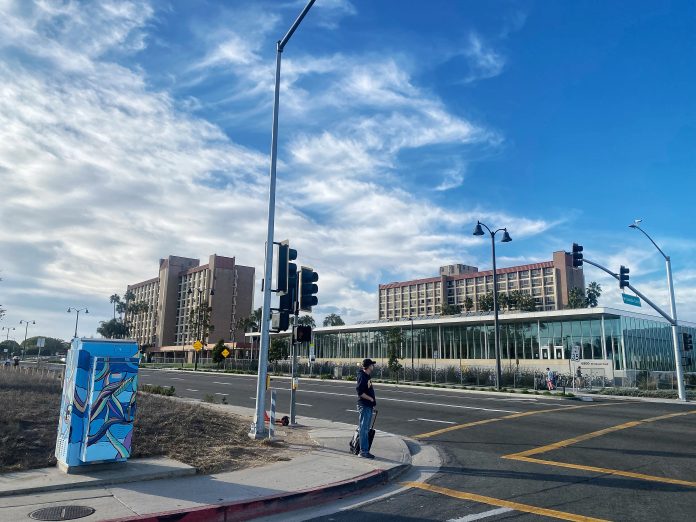Yubin Kim & Alexis Crisostomo
Campus Beat Reporter & Co-News Editor
Following the death of one of their peers, UC Santa Barbara (UCSB) students who live in the Santa Catalina residence halls started their school year reflecting on community awareness, close friends, and mental health. The student community has since had contrasting discussions regarding the university’s response to this tragic incident, many of which argue that the university’s response was insufficient.
On Sept. 26, a male student passed away in their dorm room in Santa Catalina (FT). First responders and UCSB police arrived at the scene Sunday morning to find the student unresponsive. The identity of the student and reason for death has not yet been released by the Santa Barbara County Sheriff’s Office.
Unlike previous breaches of safety, when UCSB sent out campus-wide emails and SMS alerts, there were no school-wide notifications regarding information about this student’s death.
Instead, the university chose to isolate notifications of this death to those living in North Tower, the building within FT in which the male student was found.
The Bottom Line (TBL) sat down with those in the Santa Catalina community to discuss their thoughts on the decisions the administration has made.
Like many students, second-year Livia Zhang did not find out that there was a death near her residence hall until she stumbled upon a post on her school’s subreddit.
Zhang was immediately shocked and concerned with the idea that it might have been her friend who also lived in the North Tower. After checking in with them, she wondered why she had not received an email about the situation, despite living right across from the building.
“I think that the school should have informed more people,” Zhang stated, “because only sending an email to North Tower feels like they’re disregarding the fact that that person might have had other friends — they’re not just confined to North Tower.”
She said as long as the administration consulted their family and friends beforehand for privacy reasons, they should have informed more people about this student’s death.
Additionally, Zhang argued that the email that was sent sounded detached and perfunctory. To her, the school made this death seem like a distant event rather than something that had just happened in her own backyard.
For some other students, the templated email was not necessarily insensitive or detached, but rather a means to avoid school-wide hysteria.
Markos Wong, a second-year living in North Tower, remembered feeling surprised by the news of his classmate and recalled how his community took time to slowly talk about what happened.
He pointed out that the administration might have kept notifications of this death more local and discrete to avoid causing a panic. He recalled when students received a school-wide email notification of a death last year, during the pandemic, which caused great alarm and confusion among his peers.
“I think the school maybe could have had a bit more conversation, but I understand what they’re doing [by keeping things quiet],” Wong stated.
However, some disagree. While it might cause alarm, numerous students believe that the greater community has the right to know what happens to their classmates on and off campus.
“This is someone from our school, like our community,” Livia Zhang pointed out, “and it feels a little bit like they want to keep it quiet by just informing the people in the same building.”
Both students agreed that the university should have taken more precautions by better notifying students of resources that could help them in times of need, both mentally and emotionally.
“I think there could be more of a preventative measure coming from the school, maybe send those resources out at the beginning of the year,” Wong stated. “I’m sure there were students who didn’t know about these resources until after this happened, so, maybe, I think it’d be nicer if the school sent out all those resources at the beginning of the year and made sure students were aware of it earlier.”
UCSB offers many resources for those grieving and in need of psychological counseling. Counseling and Psychological Services (CAPS) provides mental health resources including student health, student well-being, basic needs, and mental health coordination services.
According to the CAPS website, their mission is to provide “timely, culturally responsive, and effective mental health services to our diverse UCSB student body,” while prioritizing the “health, safety, and well-being of our community, on and off campus.”
For those experiencing grief, or those close to someone mourning, there are informational links on the CAPS website on language to use and methods to cope. Anyone in need of any form of help is encouraged to call CAPS and 24/7 after-hours phone counseling/consultation at (805) 893-4411.

















